We are developing the social individualist meta-context for the future. From the very serious to the extremely frivolous... lets see what is on the mind of the Samizdata people.
Samizdata, derived from Samizdat /n. - a system of clandestine publication of banned literature in the USSR [Russ.,= self-publishing house]
|
Paragraph one of this BBC story goes thus:
North Korea is in urgent need of more food aid, the UN has warned.
And the most chilling quote concerns what the South Koreans think of the North Korean nuclear bomb programme.
Our correspondent says that Seoul believes Pyongyang is raising nuclear tensions to extract a better aid offer.
In other words, this is a hostage situation, the hostages being the people of North Korea, and the hostage takers being the government of North Korea.
The usual way to end hostage situations is to storm the place and capture or kill the hostage takers. Although, come to think of it, giving the hostage takers a free, escorted trip to the nearest airport and then plane tickets to the alternative scumbag country of their choice, in exchange for the lives of the surviving hostages, would also be a good way to end this thing. Either scenario would be a big improvement.
My favourite bit of the story comes right at the end.
How come the people of North Korea are being so cruelly treated? Communism perchance? Actually, not:
Market reforms introduced in North Korea in recent years mean most people only get about half the food they need through the state and have to buy the rest themselves.
But rampant inflation inside North Korea is making it increasingly difficult for people to make up that shortfall.
Japan, the US and South Korea are key contributors to the WFP programme, but Mr Ragan says donations have slowed in the last two years.
Blame capitalism! Capitalist reforms are causing people to starve, and the capitalists are refusing to pick up the tab. The North Korean government should be more communist, in order to feed the people of North Korea properly, and the rest of the world should become more communist, in order to feed the people of North Korea properly.
Well, if the way to get someone to sort this mess out is for them to be allowed to announce that they are rescuing North Korea from the ravages of freedom and the free market, then I say: make the announcement, and get on with it.
Occasionally, life throws up little synergistic surprises. Last Sunday, I was reading a rather interesting opinon piece in the Daily Telegraph in the morning and then (quite unexpectedly) found myself breaking bread with the author of that article in the evening.
In common with a great many pundits (both amateur and professional) John O’Sullivan casts his eye over the persistantly and curiously comatose Conservative Party and, in doing so, makes a rather astute observation:
Throughout the West, but especially in the English-speaking world, parties are changing their class composition. Working and lower-middle-class voters are moving Rightwards, middle and upper-class voters, Leftwards. George W Bush won the votes of West Virginia miners in the last two elections; in Australia, John Howard was cheered by loggers: both lost votes among their own progressive middle class. Most “missing” votes in Britain belong to the working and lower-middles who have left Labour and are repelled by the Lib Dems but have not been given good reasons to vote Tory.
That may seem like a strange and rather radical suggestion to some but, actually, it does make quite a lot of sense. A great swathe of what we now call the ‘middle-class’ are not really bourgeois in the true sense of that word. Rather they are public sector professionals or elsewise beneficiaries of the client-state whose wealth and status is entirely dependent on a bloated and active government. Lower tax and less regulation is simply not in their interests.
On the other hand, members of the lower-middle and working class are having to hand over ever more of their hard-earned (either directly or by stealth) for ever less in return. It is their elderly parents who are expiring, neglected, in the corridors of state hospitals; it is their children who are being turned out from state schools without being able to read, write or articulate themselves.
This changing dynamic is just begging to be seized by anyone with the political savvy to spot the opportunity. Mind you, that probably rules out the Tories.
The recent television programme which has made the most difference to Britain has, I would say, been Jamie Oliver‘s show about school food. I did not see the show myself, but my sister, who used to be a General Practitioner, did see it, and was hugely impressed by it. She has not been the only one, to put it mildly. Never in the field of human cookery will so much be eaten, so differently, by so many, at the behest of just one celebrity chef.
My sister was especially impressed by the bit of his show where Jamie persuaded just one family to change the diet, for just one week, of their extremely troublesome and badly behaved children. The behaviour of the children was utterly transformed! They became nice, companionable people. Even more striking was that, as a treat for having eaten their meat and two veg (or whatever it was) and for behaving so well, the children were given another junk food meal, and they immediately reverted to being their old monstrous selves.
I have two comments to make about this story, beyond observing that it has had an electrifying effect upon Britain’s educrats, and school food providers.
First, it is quite wrong to blame the free market for this sorry episode. In a real free market, schools would fall over themselves to offer good meals rather than bad ones. Insofar as there is something resembling a private sector in British education, it does supply quite nutritious food. (I went to a succession of private sector schools, and the food was pretty good, in the adult sense of being nutritionally good.) When British state schools were instructed, by Margaret Thatcher, to farm out school catering to the lowest bidders, that was an exercise in state diktat, not of the freedom of a free market. In real free markets you are not compelled to buy the cheapest version of what you want. No, you buy what you truly want, and if you choose to buy something good but more expensive, fine. That is your choice.
But when the same old single customer (the government) decides that its purchases shall be obtained from slightly different suppliers, that does not make a free market. One single word, ‘privatisation’, was invented to blur this distinction, the idea being that moves in a free market direction had to be made one small step at a time, and once you have lots of separate school food suppliers, that might make it easier to move towards having lots of genuinely independent schools. And that may even be true. But the distinction thus blurred should nevertheless be insisted upon.
Second, since this is not actually a free market versus state diktat issue, but merely a good food versus bad food issue, then, if like me you agree with my sister that the kind of food Jamie Oliver has been recommending would be an improvement over junk food, then you will welcome the influence he is now having. I agree that a free market in education, as in everything, would be better. But given that education is largely nationalised, it is good, other things being equal, that the inmates of this system should be well fed rather than badly fed.
Sorry about the lack of new bloggage but a great many Samizdatistas are nursing serious hangovers in the aftermath of Saturday’s Close Encounter of the Third Kind with Vodkapundit, Jane Galt and twenty five other fine bloggy type folks…
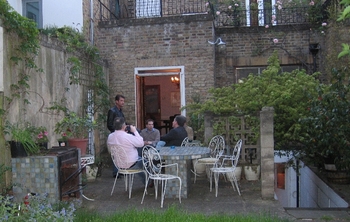
The smokers lurked outback
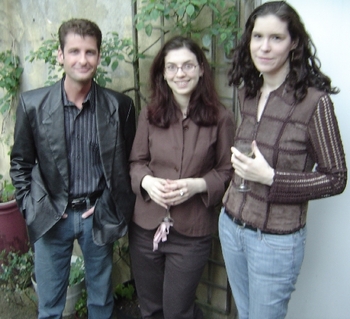
Yankee bloggers invade London!
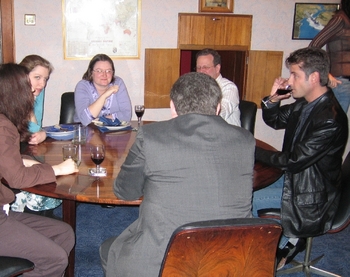
The conversations ranged from artificial intelligence to real stupidity
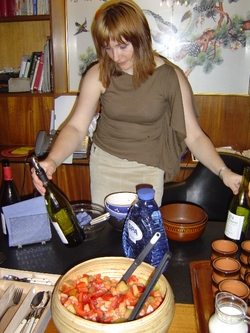
Epicurian Samizdata editor

Who the hell invited this guy?
I confess that I didn’t give any money to the tsunami relief effort, mostly because it became apparent to me within a few days that there was far more aid on its way to the area than could possibly be put to good use. I prefer that my donations go where they can make a difference.
Mark Steyn confirms that I was right not to waste my money (or rather, to give my money to the tranzis to waste).
Five hundred containers, representing one-quarter of all aid sent to Sri Lanka since the tsunami hit on Dec. 26, are still sitting on the dock in Colombo, unclaimed or unprocessed.
At the Indonesian port of Medan, 1,500 containers of aid are still sitting on the dock.
Four months ago, did you chip in to the tsunami relief effort? Did your company? A Scottish subsidiary of the Body Shop donated a 40-foot container of “Lemon Squidgit” and other premium soap, which arrived at Medan in January and has languished there ever since because of “incomplete paperwork,” according to Indonesian customs officials.
It was apparent to me that the US and Aussie military were doing everything possible to ensure that casualties would be minimized during the immediate crisis. Since long-term relief was being farmed out to the UN, and no fundamental reforms of either the UN or the countries receiving it were contemplated, well, the outcome and effectiveness of the long-term relief program was pretty predictable. The UN was being put in charge, so I sent my charity dollars elsewhere.
When rent-a-quote senators claim to be pro-U.N. or multilateralist, the tsunami operation is what they have in mind — that when something bad happens the United States should commit to working through the approved transnational bureaucracies and throw even more “resources” at them, even though nothing will happen (Sri Lanka), millions will be stolen (Oil for Food), children will get raped (U.N. peacekeeping operations) and hundreds of thousands will die (Sudan).
As tonight Samizdata.net HQ will be playing host to the Anglosphere Blogger Bash, featuring such A-list bloggers from across the Atlantic as Jane Galt and Stephen Green, blogging may be a bit erratic and/or ‘under the influance’.
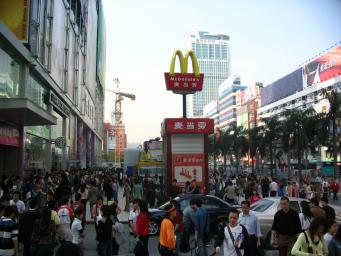

Much has been said and written (some of it by me) on the growth of the Chinese economy and the rise of China as an economic power, and of the growth of an immense manufacturing region on the sides (particularly the east side) of the estuary of the Pearl River between Hong Kong and Guangzhou (Canton). If there is a workshop of the world today the way there was in the north of England in the mid 19th century, then this is it. I have for a while wanted to go and look at it, but I have usually lacked either the time or the money. Ideally I would like to start in Hong Kong, work my way upstream through Shenzhen and Dongguan to Guangzhou, and then back down the other side of the estuary via Zhongshan and Zhuhai to Macau, on the opposite side of the estuary to Hong Kong.
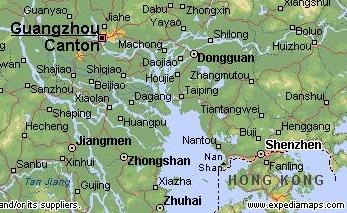
But alas I have still not been able to do this. However, in March I arranged a trip to Australia to visit my family. And I was able to manage a stopover in Hong Kong for three days. Although I was not going to be able to do the trip up and down the estuary that I had hoped to do, I was at least able to spend one day doing something a little interesting, which was to cross the border from Hong Kong to Shenzhen in China proper.
Well, sort of in China proper.Shenzhen is a “Special Economic Zone”. China gave Shenzhen this status in 1980 . (The status was subsequently given to Zhuhai across the border from Macau, the port of Shantou north of Hong Kong, Xiamen in Fujian provice across the water from Taiwan, and the southern island province of Hainan). These areas were given more economic freedom that the rest of China, and more importantly were open to investment from and trade with the rest of the world. This was convenient with the people of Hong Kong, as at that time Hong Kong was undergoing the transition from poor to rich, and labour in Hong Kong was becoming too expensive for the traditional textiles and other low cost manufacturing base to survive in Hong Kong. What happened was that the manufacturing moved across the border to Shenzhen, a boom ensued, and people (to the extent that they were allowed to) flocked to Shenzhen from other regions of China. Since then, much the same thing has happened to Shenzhen as happened to Hong Kong,although Shenzhen remains a less sophisticated place.

A lot of trading and lower level services, including that with slightly more questionable business practices, has moved to Shenzhen. Labour has become too expensive in Shenzhen for a lot of the low cost manufacturing to take place there, so it has moved further upriver, particularly to Dongguan. (Capacity constraints are much more stretched on the east bank than the west, which is the impetus for a proposal for a huge bridge connecting Lantau island in Hong Kong with Macau and Zhuhai on the other side of the estuary, construction of which is scheduled to commence later this year).
In any event, on Sunday morning I got the train from Kowloon to Lo Wu and (after a few hassles with getting a visa at the border) crossed over into Shenzhen.
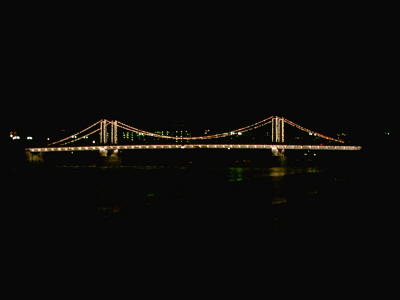
I guess this makes David Carr happy
Initially it felt like sleazy border towns everywhere, but it ultimately turned out to be far more interesting that that. → Continue reading: A belated report on a trip to the wild East.
There can surely be no more conclusive evidence of market success than the trademark name of a particular company becoming the commonly used verb to describe the activity for which said company provides its products. Have you ‘googled’ anyone today? Have you ever been ‘googled’ yourself?
As someone who ‘googles’ on pretty much a daily basis, I can find no material fault with this richly-deserved and glowing tribute in the UK Times:
Google is the modern Oracle, the all-knowing mechanical sage we consult to find, if not the answers to life’s questions, then at least a comfortable, reasonably priced hotel in Torquay. But is Google God?
I cannot recall such a mystical (and, for some, blasphemous) suggestion ever crossing my mind but, like the author, I am only too ready to wax lyrical about the benefits of Google’s simple and effective information gathering machine.
Google may have all the answers but, unlike God, lots of Google’s answers tend to be wrong, loopy postings from lonely people typing late at night in their underwear. Google moves in mysterious ways all right, but some of those ways are downright weird.
To whom could he possibly be referring? → Continue reading: Stick to what you don’t know
An assortment of cool web stuff* encountered in recent days:
Most excellent puppeteering in General Electric’s Facing That Void.
Fun CG animation ride. (warning:contains computer simulated amphibian genitalia)
I can’t remember a purer shot of joy than this Kokonono promo.
*Don’t even waste your time over a dial-up – this is all broadband stuff. Thanks to our rather disturbed friends at Screenhead, BTW.
The United States has imposed new quotas on textile imports in order to protect American textiles manufacturers from competition. The move is bad news for American consumers and it is also bad news for the world’s poorest. Some of the blame must be apportioned to the campaigns of protectionists like Britain’s Christian Aid which have been claiming – incorrectly – that textiles liberalization is not in the interests of the poor. They have helped create a worldwide feeling of unease about the end of quotas.
The result is that America has now taken action, not to help producers in developing countries, but to protect uncompetitive American producers. America’s move is unwarranted and unjustified. The former European trade commissioner and future WTO boss, Pascal Lamy, has attacked the new quotas:
Mr. Lamy said that the global trade body [WTO] had been easing out the quota system over the last decade and that all countries had been given ample opportunity to prepare for the changes.
“It is not the law of the jungle, and the W.T.O. rules were clearly set,” he said. “Why are some politicians now not recognizing that fact?”
Fortunately, the new quotas will have to go by 2008. But in the meantime, America’s move means that developing countries will have worse jobs, less wealth creation and less trade. Is this really what Christian Aid was aiming for?
Crossposted from the Globalisation Institute Blog.
One of the regular contributors to the Libertarian Alliance Forum posted this salutary tale concerning his local state school.
I felt that it deserved a wider audience.
Yesterday my wife went to register our oldest child at the local ‘gubmint’ school here in the Atlanta ‘burbs. It will be his first year in the public school system.
To prove that we live in the catchment area, she had with her an electricity bill with our address on it. There was a printed notice posted in the registration area. It listed the only forms of identification that would be accepted. At the bottom of the notice was printed “NO ACCEPTIONS!”
My wife found this illiteracy in a supposed place of learning to be very disconcerting, but carried on with the process.
Next, she was handed a slew of forms to complete and sign. One of the forms was a waiver for field trips. This form explained that “our student’s will attend a number of field trips…”
That was it. Glaring spelling mistakes on professionally printed notices, moronic misuse of an apostrophe on a form that must surely have been reviewed by the principal. A sickening feeling came over her and she had to make her excuses and leave, explaining that she would fill in the forms later.
The received wisdom of our day holds that only the state can be relied upon to provide children with a proper education. I wonder how long that canard can hold fast in the face of all the glaring evidence to the contrary?
[My thanks to Rob Worsnop who posted this to the Libertarian Alliance Forum]
A retaining wall in the Upper West side of New York at the Hudson River, just up-river from the George Washington Bridge has collapsed and buried several parked cars at the very least. I was unable to find out if anyone had been caught in the collapse: no one seemed to know at the time I was asking around.
Since I am on the same side as the collapse, I was unable to get into a position to get a picture. There is nowhere one could do so without standing on part of the hillside which has just collapsed and the NYPD has the cliffside cordoned off in both directions for many blocks. I know. I tried.
I do know that the Henry Hudson Parkway is closed and traffic in NYC is a royal mess right now.
I ha ve never in my life heard so many sirens and seen so many emergency vehicles. Lines of them filling city block after city block and off into side streets. Broadcast vans from every station in New York with a news program. Talking hairdo’s smiling into TV cameras every which way you look. Police smiling and saying absolutely nothing about what is going on. Lots of the folk thought it must be a terrorist threat because there was nothing but rumour floating through the gathered crowds.
You will get the details on the News at Eleven… but I will start uploading some of my on the scene photos. So, here goes… Dale Amon reporting Live and On The Scene in New York City…. Roll ’em!
Move along now, nothing to see here…
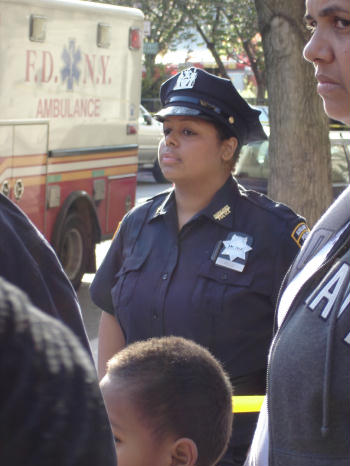 Photo: D.Amon all rights reserved Photo: D.Amon all rights reserved
The line of emergency vehicles fades off into the distance.
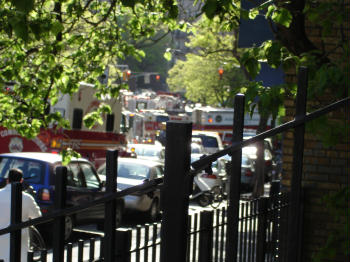 Photo: D.Amon all rights reserved Photo: D.Amon all rights reserved
Notice the herd of cameramen down on the edge of the hillside where they can all go down together. Somewhere along there and below is my best current guess as to where the collapse occurred.
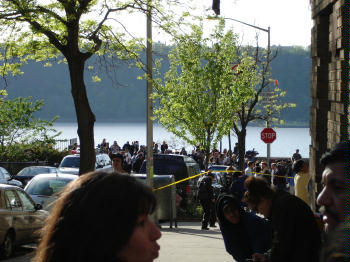 Photo: D.Amon all rights reserved Photo: D.Amon all rights reserved
Gee, Perry, when can we get one too?
 Photo: D.Amon all rights reserved Photo: D.Amon all rights reserved
The talking heads were out in force.
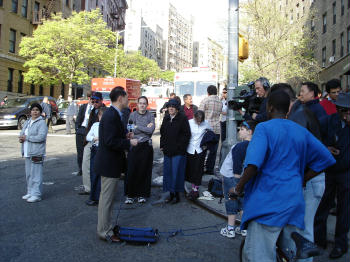 Photo: D.Amon all rights reserved Photo: D.Amon all rights reserved
A newsgirl and her cameraman.
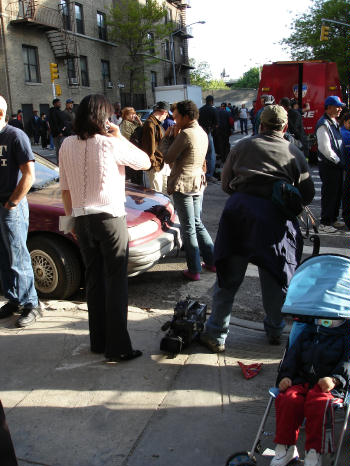 Photo: D.Amon all rights reserved Photo: D.Amon all rights reserved
This is a couple blocks upriver. Beautiful view but still cordoned off. Note the hardhats and police near the hillside.
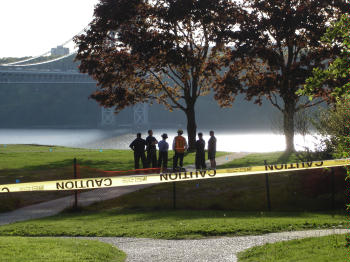 Photo: D.Amon all rights reserved Photo: D.Amon all rights reserved
This shot is from about three or four blocks upriver. Obviously you cannot see the collapse, but it does give you an idea where it happened. That is the George Washington Bridge.
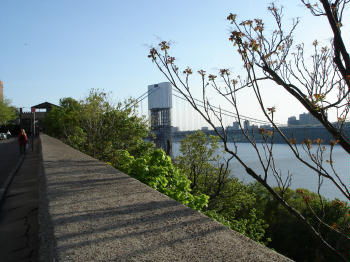 Photo: D.Amon all rights reserved Photo: D.Amon all rights reserved
Coffee break time I presume…
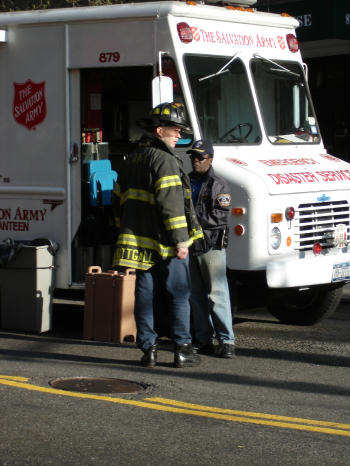 Photo: D.Amon all rights reserved Photo: D.Amon all rights reserved
Update: No one was hurt; cleanup will probably take through the weekend; traffic on the Henry Hudsen Parkway is being diverted at 181st St.
Morning Update: I was able to get to a location from which I could get a photo of the actual collapse area and it was not where I’d thought it, but a block further upriver. The big worry yesterday was whether or not some apartment buildings had been undermined. Engineers determined they were safe so this morning it was easy for me to get within telephoto range.
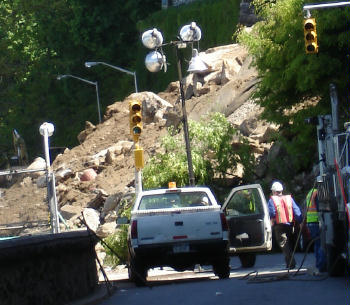 Photo: D.Amon all rights reserved Photo: D.Amon all rights reserved
|
Who Are We? The Samizdata people are a bunch of sinister and heavily armed globalist illuminati who seek to infect the entire world with the values of personal liberty and several property. Amongst our many crimes is a sense of humour and the intermittent use of British spelling.
We are also a varied group made up of social individualists, classical liberals, whigs, libertarians, extropians, futurists, ‘Porcupines’, Karl Popper fetishists, recovering neo-conservatives, crazed Ayn Rand worshipers, over-caffeinated Virginia Postrel devotees, witty Frédéric Bastiat wannabes, cypherpunks, minarchists, kritarchists and wild-eyed anarcho-capitalists from Britain, North America, Australia and Europe.
|


















